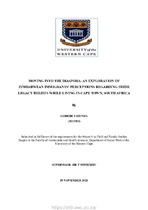Moving into the diaspora: an exploration of Zimbabwean immigrants' perceptions regarding their legacy beliefs while living in Cape Town, South Africa
Abstract
Background: Over the past decade, the influx of Zimbabweans into the Diaspora heightened after the dismal failure of the Land Reform Policy saga, resulting in a political, social and economic crisis. South Africa being the first and ranked highest destination for Zimbabwean immigrants became a second home to these immigrants, however, little is known about their legacy beliefs. This study was guided by the theory of typology for legacy beliefs and generativity, which is the seventh stage of Erik Erikson’s eight stages of psychosocial development. Aim: The aim of this research was to explore and describe the perceptions of Zimbabwean immigrants regarding their legacy beliefs while living in South Africa. Two main objectives identified were: (i) To explore and describe Zimbabwean immigrants’ perceptions and their understanding regarding legacy beliefs. (ii) To explore and describe the factors influencing the Zimbabwean immigrants’ legacy beliefs. Methods: A social constructivism paradigm that embraced explorative and descriptive qualitative research designs was utilised to answer the research question: How do Zimbabwean immigrants perceive legacy beliefs while living in Cape Town, South Africa? Fifteen participants were purposively selected and they participated in the unstructured individual interviews that were audio-recorded and transcribed verbatim. The data collected was thematically analysed utilising Creswell's (2009) six steps of data analysis and the process was trustworthiness, as the researcher adhered to credibility, transferability, conformability, and dependability. Ethical approval was sought from HSSREC and the principles of confidentiality, self-determination, no harm, and beneficence were ensured. Four main themes emerged: Understanding of legacy beliefs; Categories of legacies shared in families; Re-emerging legacies in families and Challenges in preserving family legacy beliefs. Conclusion: Based on the research findings recommendations were made to immigrant parents, social service professionals and governmental institutions on how to alleviate the challenges that come with being an immigrant and trying to preserve one's legacy beliefs.

